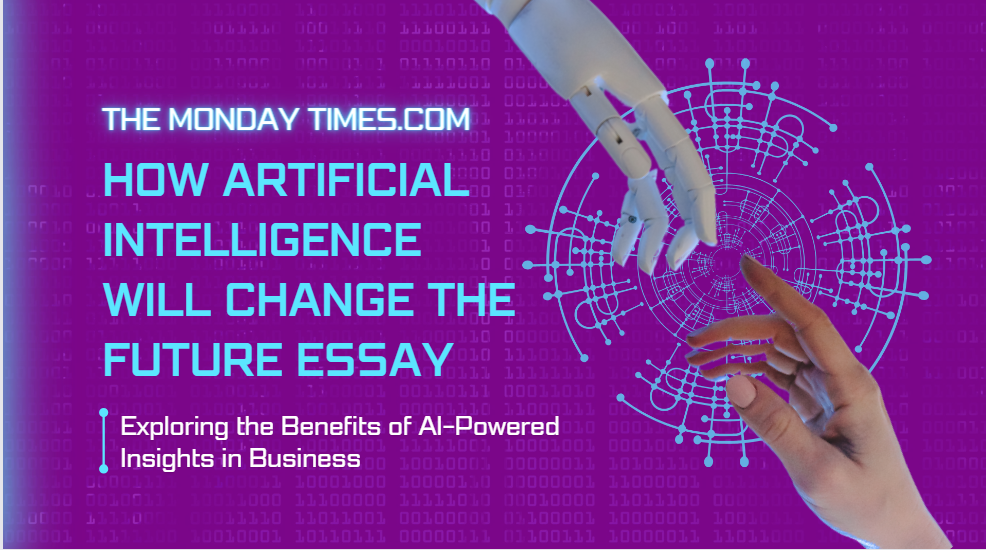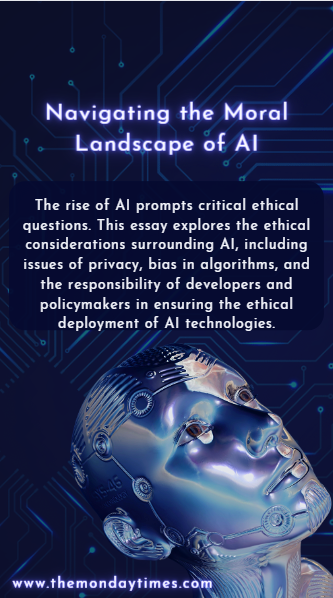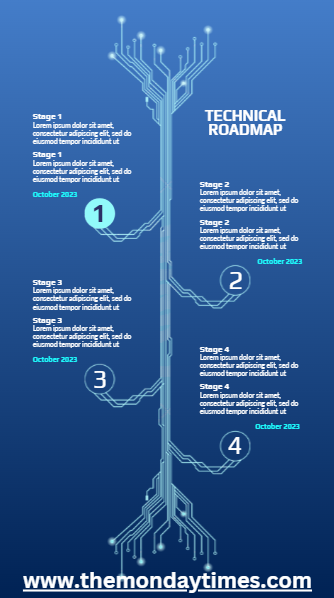How Artificial Intelligence Will Shape the Future

In an era defined by rapid technological advancements, one innovation stands out as a transformative force that is reshaping the landscape of our existence—Artificial Intelligence (AI). This essay explores the profound impact AI is poised to have on the future and how it will shape various aspects of our lives.
Introduction: Embracing the Age of Artificial Intelligence
The advent of Artificial Intelligence marks a pivotal moment in human history, signifying a shift towards a future where machines augment our capabilities, transforming the way we work, live, and interact with the world. As we delve into the realms of AI, we begin to unlock unprecedented possibilities that hold the potential to revolutionize every facet of our existence.
The Evolution of AI: A Journey Through Time
To understand the future impact of AI, we must first appreciate its evolution. From rudimentary rule-based systems to today’s sophisticated machine learning algorithms, AI has come a long way. This section provides a brief overview of the historical journey of AI, setting the stage for the monumental changes that lie ahead.
AI in Healthcare: Revolutionizing Wellness and Care

One of the most promising domains where AI is set to make a profound impact is healthcare. This section explores how AI-powered diagnostics, personalized medicine, and predictive analytics are poised to revolutionize patient care, making healthcare more efficient, accessible, and tailored to individual needs.
AI and the Workforce: Navigating the Future of Employment
As AI becomes increasingly integrated into the workforce, concerns about job displacement and the changing nature of work have emerged. This section delves into the ways AI is reshaping industries, creating new job opportunities, and the importance of upskilling to navigate the evolving job market.
Ethical Considerations: Navigating the Moral Landscape of AI
The rise of AI prompts critical ethical questions. This essay explores the ethical considerations surrounding AI, including issues of privacy, bias in algorithms, and the responsibility of developers and policymakers in ensuring the ethical deployment of AI technologies.
Education in the Age of AI: Fostering Innovation and Lifelong Learning
AI is not only a tool for industry transformation but also a catalyst for innovation in education. This section discusses how AI is revolutionizing education through personalized learning experiences, adaptive curricula, and the cultivation of essential skills for the future workforce.
Conclusion: Shaping a Future Powered by Artificial Intelligence
As we stand on the cusp of an AI-driven future, the possibilities are both exhilarating and daunting. This essay concludes by emphasizing the need for responsible development, ethical deployment, and continuous exploration of the potential AI holds to positively impact our world. Embracing the age of Artificial Intelligence is not just a choice; it is a collective responsibility to ensure a future that is intelligent, inclusive, and shaped by the limitless possibilities AI presents.
how artificial intelligence will change the future essay
In an era defined by rapid technological advancements, one innovation stands out as a transformative force that is reshaping the landscape of our existence—Artificial Intelligence (AI). This essay explores the profound impact AI is poised to have on the future and how it will shape various aspects of our lives.
Embracing the Age of Artificial Intelligence
The advent of Artificial Intelligence marks a pivotal moment in human history, signifying a shift towards a future where machines augment our capabilities, transforming the way we work, live, and interact with the world. As we delve into the realms of AI, we begin to unlock unprecedented possibilities that hold the potential to revolutionize every facet of our existence.
The Evolution of AI: A Journey Through Time
To understand the future impact of AI, we must first appreciate its evolution. From rudimentary rule-based systems to today’s sophisticated machine learning algorithms, AI has come a long way. Early AI aimed to replicate human intelligence, but contemporary AI focuses on learning from data and adapting to new information. This section provides a chronological overview of AI’s historical journey, from the Turing Test to the development of neural networks, laying the foundation for the monumental changes that lie ahead.
AI in Healthcare: Revolutionizing Wellness and Care
One of the most promising domains where AI is set to make a profound impact is healthcare. The integration of AI into healthcare systems is poised to revolutionize patient care. AI-powered diagnostics can analyze vast datasets to identify patterns and trends, enabling early detection of diseases. Personalized medicine, guided by AI algorithms, tailors treatment plans to an individual’s unique genetic makeup, optimizing efficacy. Additionally, predictive analytics can enhance healthcare management by forecasting disease outbreaks and resource needs. This section explores these transformative applications, shedding light on how AI is making healthcare more efficient, accessible, and tailored to individual needs.

AI and the Workforce: Navigating the Future of Employment
As AI becomes increasingly integrated into the workforce, concerns about job displacement and the changing nature of work have emerged. This section delves into the ways AI is reshaping industries, creating new job opportunities, and transforming existing roles. Automation of routine tasks allows human workers to focus on more creative, complex, and value-added activities. However, it also raises questions about the need for upskilling and reskilling to navigate the evolving job market. Addressing these challenges is crucial for ensuring a harmonious relationship between humans and machines in the workplace.
Applications of AI in the Workplace:
- Automation: AI is used to automate repetitive and routine tasks, allowing employees to focus on more complex and creative aspects of their work.
- Data Analysis: AI can analyze vast amounts of data quickly and accurately, providing valuable insights for decision-making. how artificial intelligence will change the future essay
- Virtual Assistants: AI-powered virtual assistants help with tasks such as scheduling, email management, and answering queries, increasing overall efficiency.
- Predictive Analytics: AI algorithms can predict future trends, helping businesses make informed decisions and plan strategies.
- Customer Service: Chatbots and virtual assistants powered by AI can handle customer inquiries, improving response times and user experience.
- Human Resources: AI can assist in the recruitment process by screening resumes, conducting initial interviews, and identifying suitable candidates.
- Cybersecurity: AI is used to detect and respond to potential security threats by analyzing patterns and anomalies in network behavior.
Ethical Considerations: Navigating the Moral Landscape of AI
The rise of AI prompts critical ethical questions that demand careful consideration. This essay explores the ethical considerations surrounding AI, including issues of privacy, bias in algorithms, and the responsibility of developers and policymakers in ensuring the ethical deployment of AI technologies. As AI systems make decisions that impact individuals and societies, transparency, accountability, and fairness become paramount. Examining these ethical dimensions is essential to establishing guidelines and frameworks that safeguard against potential pitfalls and ensure the responsible development and use of AI.
Education in the Age of AI: Fostering Innovation and Lifelong Learning
AI is not only a tool for industry transformation but also a catalyst for innovation in education. how artificial intelligence will change the future essay , This section discusses how AI is revolutionizing education through personalized learning experiences, adaptive curricula, and the cultivation of essential skills for the future workforce. AI-powered educational tools can tailor learning experiences to individual student needs, identifying strengths and weaknesses to provide targeted support. Embracing AI in education requires a shift towards a model of lifelong learning, where individuals continually acquire new skills to adapt to the evolving demands of the digital age. By leveraging AI in education, we can empower learners and prepare them for the dynamic challenges of the future.
how artificial intelligence will change the future essay
Key Concepts and Techniques in AI:
- Machine Learning (ML): ML is a subset of AI that focuses on developing algorithms that enable computers to learn from data. There are three main types of machine learning: supervised learning, unsupervised learning, and reinforcement learning. how artificial intelligence will change the future essay
- Deep Learning: Deep learning is a subfield of machine learning that involves neural networks with multiple layers (deep neural networks). Deep learning has shown remarkable success in tasks such as image and speech recognition. how artificial intelligence will change the future essay
- Natural Language Processing (NLP): NLP enables computers to understand, interpret, and generate human language. It is used in applications like chatbots, language translation, and sentiment analysis. how artificial intelligence will change the future essay
- Computer Vision: This field involves enabling machines to interpret and make decisions based on visual data. Applications include facial recognition, object detection, and autonomous vehicles. how artificial intelligence will change the future essay
Conclusion: Shaping a Future Powered by Artificial Intelligence
As we stand on the cusp of an AI-driven future, the possibilities are both exhilarating and daunting. This essay concludes by emphasizing the need for responsible development, ethical deployment, and continuous exploration of the potential AI holds to positively impact our world. Embracing the age of Artificial Intelligence is not just a choice; it is a collective responsibility to ensure a future that is intelligent, inclusive, and shaped by the limitless possibilities AI presents. The transformative power of AI is evident across healthcare, the workforce, ethical considerations, and education, heralding a future where human potential is amplified by intelligent technologies.